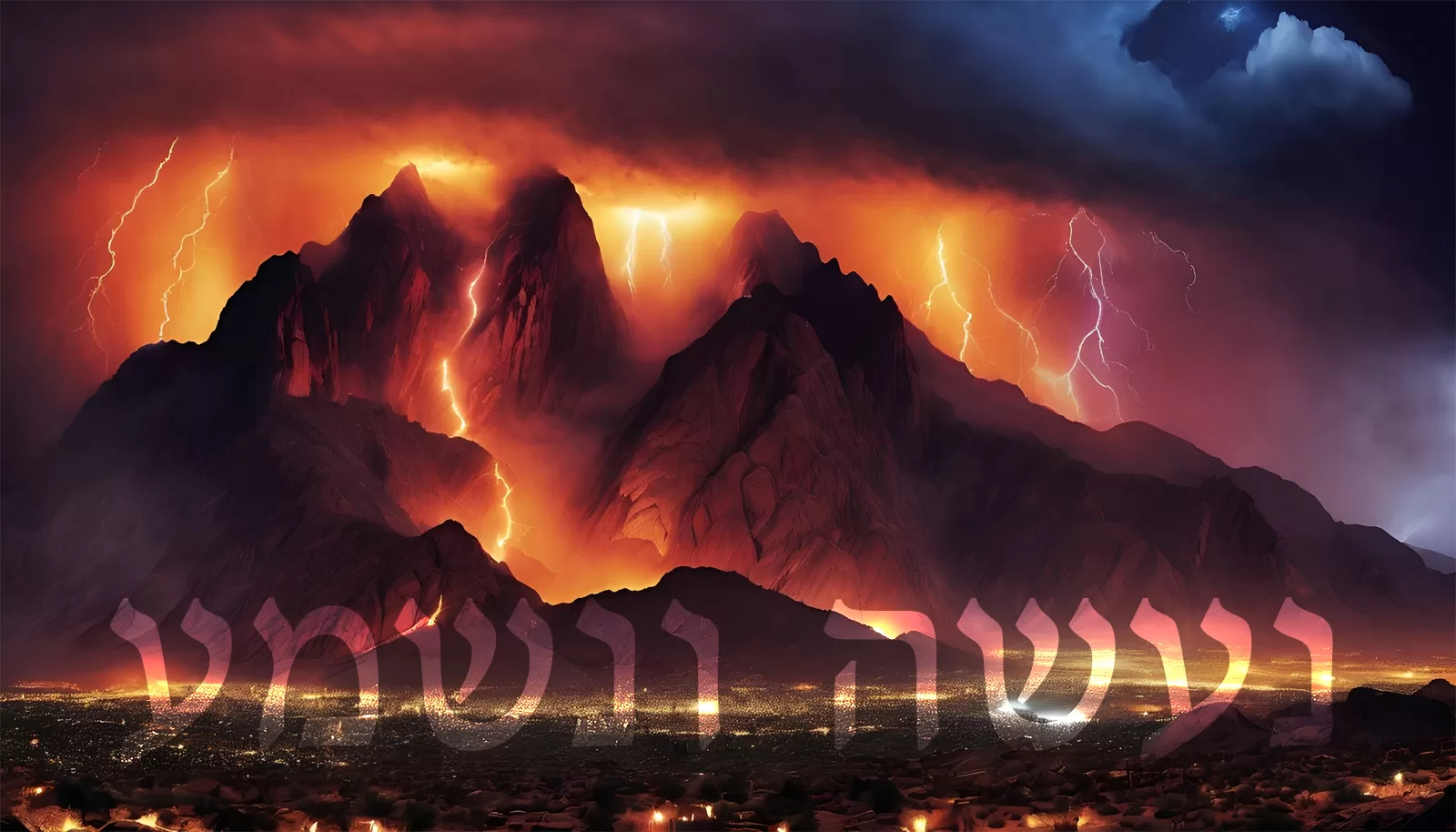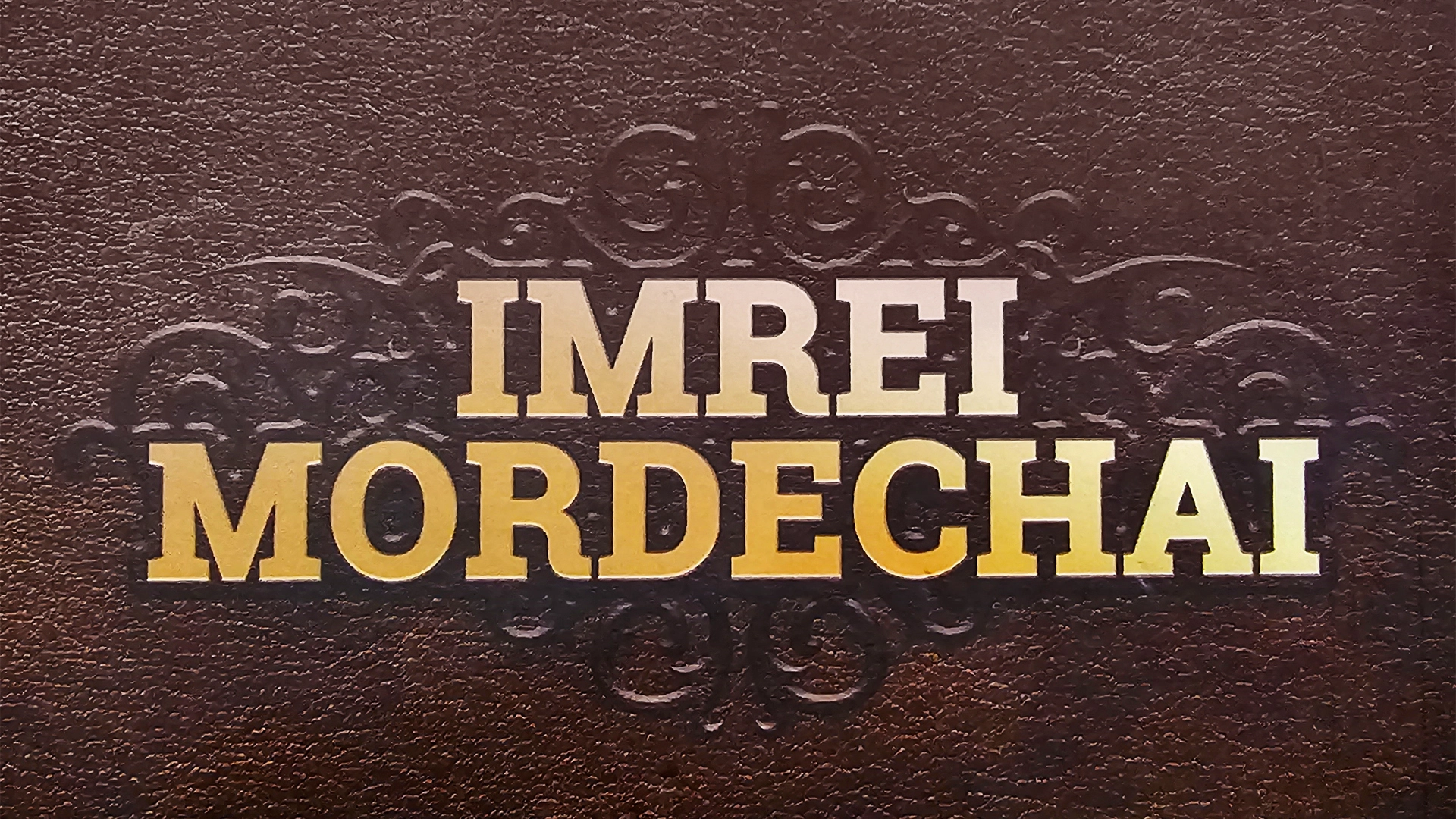May 5th, 2024 / 6th of Iyar, 5784

When Yisrael preceded naaseh to nishma [“we will do” to “we will hear”], a heavenly voice emanated and said to them: Who revealed to My children this secret, which the malachei hashareis use? (Shabbos 88a)
The baalei mussar ask: what is the big deal about saying naaseh venishma [we will do and we will hear]? At Sinai, they were about to receive the Torah. What would have been wrong with declaring that they were ready to hear and learn all of the mitzvos [commandments] of the Torah, and once they knew them, they would do them right away? What would have been wrong with declaring: nishma venaaseh [we will hear and we will do]?
Had the Bnei Yisrael [Children of Israel] said it in reverse, nishma venaaseh, their kabalas HaTorah [receiving of the Torah] would have been lacking. They could not claim to have accepted the mitzvos with complete willingness. This is because once they would have heard Hashem’s commandments, they would have been obligated to fulfill whatever they heard. They would relate to it either as the edict of the king, or as the general obligation to do the king’s will. In such a situation, it would have been impossible to hear Hashem’s will and not do it. Once He tells you, how can you say ‘no?’ Therefore, had they first heard the mitzvos before agreeing to do them, they would no longer have had any choice in the matter. Even if what they heard would not have been a commandment, but rather an expression of Hashem’s will, which they had permission either to do or not do, it still would not have been possible for them to reject His will. Not to obey, at this point, would have been tantamount to rebellion against G-d Himself.
By saying naaseh [we will do] first, this showed that on their own, their will was to do Hashem’s will, without being forced at all. There was complete and uncompromised will on the part of the Jews to accept the Torah, even with the awareness that once we would know His will, this knowledge would force us to do it. This was a more perfect acceptance of the yoke of service to the Creator out of our free will.
We were like one who comes before the king to declare: I am here before you, ready to do whatever you say.
The very act of standing before the king requires an independent, un-coerced decision, and this is the state of the angels, who stand ready to do Hashem’s will, with no free choice of their own.
Still, there was room to err and say the opposite, that one who says naaseh venishma does not leave himself the right to choose, since he already obligates himself to do whatever he is commanded. On the other hand, to say: “first, I’ll hear [about the commandments,] and then I will do them” — this sounds to us like making a choice. The very act of hearing is one of choice, with room for discussion and negotiations. Imagine — a buyer is approached by a pushy salesman who tells him: “Take out your wallet, I have exactly what you need.”
“Not so fast,” the buyer says. “First, let’s heard what you have to sell. Later, I’ll decide whether to buy or not.” The matter is now in the realm of free choice.
But the truth is, leaving himself room to decide by saying nishma does not guarantee that after he hears and decides what to do, the decision he makes will be utterly independent and not influenced in any way. In the case of the salesman, the buyer was never actually in a position where he had to make the purchase. Therefore, he could properly assess the situation and make a decision. When it comes to an “offer,” as it were, from the Creator Himself, the very knowledge that the will of the Creator is that you accept, forces you to accept it, as we said.
What comes out is a very big difference between us and the gentiles. When the gentiles said nishma venaaseh, even if afterwards they would have accepted the Torah, this would not have been called “free will” in a complete sense, since in any case they would have had to accept this, once they knew it was Hashem’s will. But when the Jews said naaseh first, their free will was fully intact.
Of course, just saying naaseh [we will do] on its own is not enough. There must be a nishma [we will hear] in order to know what to do, but the naaseh that came first showed complete bitul to Hashem’s will, done by the nation entirely with free will.
Rav Chaim Zimmerman would always say that in every nishma there are two parts: (1) a command, and (2) Hashem’s will. Often, the element that is Hashem’s will is for us voluntary, such as when we are machmir [stringent], even though strictly speaking we don’t have to be. There is no actual command, but since nishma also includes Hashem’s will, there is room to be machmir to do His will.
When a person cares about what Hashem wants, and wants to give Him nachas ruach [satisfaction], this is included in ratzon [will of] Hashem.
The Avos [Fathers] fulfilled the entire Torah before it was given, as a true expression of the second part of nishma, since they had no command and nevertheless wanted to fulfill His will. This is called eino metzuveh ve’oseh [one who is not obligated in a mitzvah and nevertheless does it].
We find, though, by Avraham Avinu [our father Abraham], that he understood that it was Hashem’s will that he circumcise himself, but he did not want to do this without being commanded first. It wasn’t enough for him to fulfill the will of Hashem alone. He waited until Hashem commanded him, since the bond that bris mila [covenant of “circumcision”] makes between us and Hashem happens only when it is done as a commandment.
Since by first saying naaseh we obligated ourselves to fulfill whatever Hashem said, we must think: what is the meaning of nishma? On our own, we’d say that it means finding out what the commandments are and how to do them. This would make kabalas HaTorah into something technical.
But we want to say that nishma is something separate, and within it is the obligation to work hard to understand the Torah.
While we see that when Moshe Rabbeinu [our master/teacher Moses] had any doubt, he would prophesy right away without any seeming exertion; however, this was the case only for Moshe. Only Moshe could say to those who asked him questions in halacha: “Stand up and I will hear what Hashem commands you” (Bamidbar / Numbers 9:8). Everyone else, including Yehoshua [Joshua] and his great generation, the dor dei’ah [generation of knowledge], had it different, as it states in Temurah (16a):
“When Moshe Rabbeinu was about to take leave of this world, he told Yehoshua: “Ask me about all of the doubts you have [in Torah].”
Yehoshua replied: “Rebbe, did I ever leave you even for a moment and go somewhere else? Didn’t you write about me, ‘and his servant, Yehoshua bin Nun, the lad, would not leave the tent [of study].’ At once, Moshe’s strength waned and Yehoshua forgot 300 halachos [ways of correctly applying the Torah], and 700 doubts arose within him. The nation rose up to kill him.
Hashem told Yehoshua: “To tell you [the forgotten laws], this is impossible. Go and occupy the nation by waging war.”
And it states in a Beraisa that seventeen hundred kal v’chomer [light and heavy] arguments, gezeiros shavos [applying one verse to another based parallel wording] and dikdukei sofrim [grammatical understandings] were forgotten during the period of mourning for Moshe.
They had to work hard to figure out what to do in matters where there was doubt.
Even though it states about Torah, “it is not in the heavens . . . but it is close to you” (Devarim 30:11-14, see Rashi), we see that to arrive at clear laws, it doesn’t come easy. There are a lot of details, and you have to encompass whole subjects, which takes a lot of strenuous work.
This explains why each Jew received two crowns at Har Sinai, one for naaseh and the other for nishma. The second crown for nishma showed that learning Torah was not just a technical matter, of knowing how to fulfill the naaseh. If so, nishma would simply be an adjunct of naaseh, and only one crown would be deserved. Rather, nishma was a new entity, which requires a great deal of exertion, as we find by Yehoshua, who had to work strenuously to resolve the doubts, unlike Moshe, who could find the answers right away through nevuah [prophecy]. This process is part of kabalas HaTorah, and fits into the word nishma.
For example: “Honor your father and mother.” Even though it seems only natural for a child to honor his parents, this is a deep mitzvah, one that requires profound thought to be understood. All this study is part of the nishma, an integral part of kabalas HaTorah.
If so, we come out with a clear understanding of naase venishma: (1) naaseh is a shibud of our free will to do Hashem’s will fully. (2) Nishma is the willingness to engage in the hard work of understanding the Torah, to gain as much as we can in it.
Excerpted with permission from Imrei Mordechai, Vol. 2, A Collection of Inspirational Insights from the “Mussar Shmoozes” of HaGaon Rabbi Mordechai Goldstein Ztzvk”l, The Imrei Mordechai Institute, Diaspora Yeshiva Toras Yisrael, Mount Zion, Jerusalem, Kislev 5779.

Share This!
From beginner to advanced, if you’re a Jewish man, 18 to 35 years of age, and you’re ready to give your heart to HaShem, and to get serious about learning Torah, Diaspora Yeshiva has a place for you with us on Mount Zion, Jerusalem.